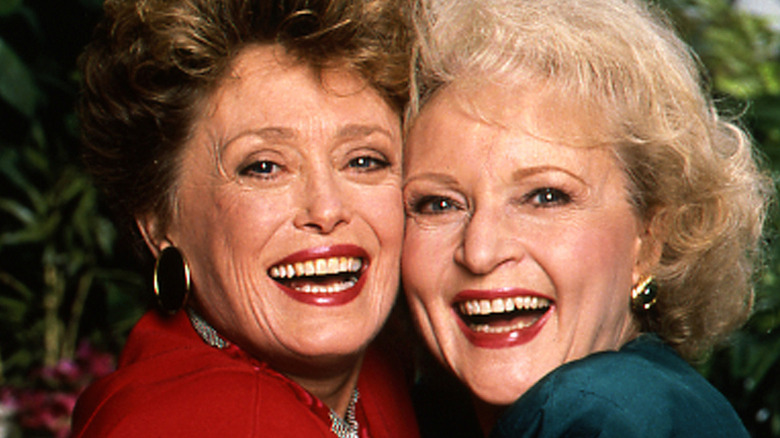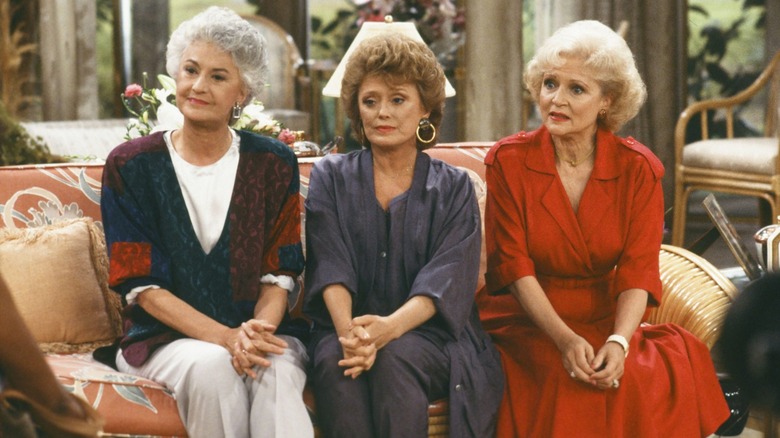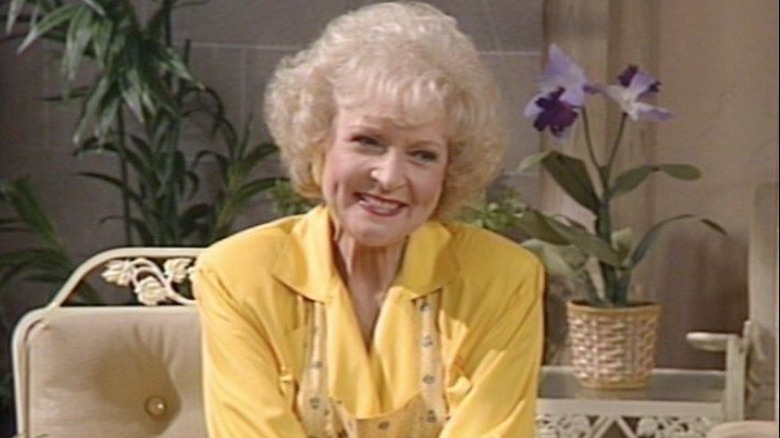Why Betty White Was Perfect As Rose On The Golden Girls, Despite Originally Auditioning For Blanche
Stories about the making of "The Golden Girls" get bandied around as often as Sophia's (Estelle Getty) tall tales about her youth in Sicily. It makes sense: one of the major joys of the warm-hearted sitcom was watching its four roommates entertain each other through storytelling, so of course fans would be preoccupied with the behind-the-scenes stories that made "The Golden Girls" great. The recent passing of star Betty White makes these familiar stories feel even more like a balm to the soul than usual.
One of the most enduring true stories about "The Golden Girls" involves Betty White's casting, and is described in Ray Richmond's book, "Betty White: 100 Remarkable Moments in an Extraordinary Life." After playing flirtatious, competitive Sue Ann Nivens on "The Mary Tyler Moore Show," White was a shoo-in for the role of Blanche when the script for "The Golden Girls" came around. But when Rue McClanahan wasn't quite clicking as Rose, yet nailed the initial read for Blanche, pilot director Jay Sandrich talked White into switching roles.
Blanche Was Too Similar To White's Previous Role
In her own book, "Here We Go Again: My Life In Television," White described initially being "heartsick" when she learned she had ended up with the role of Rose.
"From the script we had read, we knew the strong character of Dorothy, and her brutally frank mother, Sophia. We understood the lustful Blanche, but I hadn't a clue who Rose was."
White goes on to write that when Sandrich explained that White as Blanche would just be seen as "Sue Ann Nivens revisited," everything clicked, and she realized she could play Rose. Along with the show's talented writers, she crafted Rose Nylund into a series standout — the kind of character who garners longer and more robust live audience laughter than anyone else.
The character is endlessly sweet but hopelessly stupid, frequently missing the conversational point and offering ridiculously misguided input in the face of the sitcom's problems of the week. Rose is also, most memorably, prone to long-winded and absurd stories about her former life in St. Olaf, Minnesota, a town that Rose slowly reveals is overflowing with strange characters, logic-defying traditions, and vast, Norwegian-influenced local lore.
White Played Dumb In The Smartest Way Possible
Richmond described the way White made playing Rose look easy to Today, saying, "It was all in the way she created the character. It was all underneath." White juggled Rose's naivety with her own sharp comedic timing, creating a slightly meta sitcom double. Despite her impressive ability to keep a straight face, fans could tell from the glint in the actress' eyes and the way she timed her jokes for laughter that White had a total, controlled understanding of what made the character work.
Though the live studio audience model is nearly extinct now, it worked extremely well for "The Golden Girls." The actresses would often need to hold incredulous facial expressions in response to jokes while waiting for the giggles to die down, but White's air-headed character was able to react with an empty, point-missing smile instead. She was often the funniest person to watch, even when she wasn't speaking. White could cheerfully drop a line about the time St. Olaf put on a production of "A Christmas Carol" with a cast made entirely of chickens, then hold her endearing, dimpled smile for as long as necessary while the studio audience roared with laughter. Sometimes, her generous, purposely vacant smile would even grow as the laughter swelled.
Betty White's Rose Nylund is one of the most memorable characters in sitcom history, and it's all because the actress–and the writers who wrote to her strengths–refused to let her be one-note. It would've been funny enough for Rose to simply be dumb and sweet, but with her perfect delivery of the St. Olaf monologues, White transformed her into a fascinating, near-mythic figure of silliness that still has new viewers doubled over with laughter decades later.


